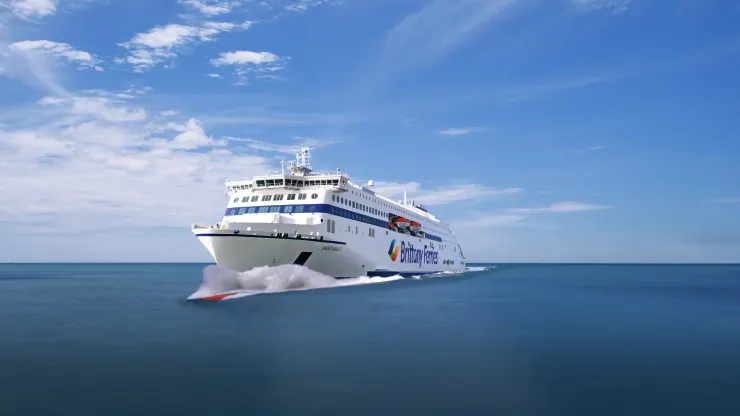
A ship set to carry passengers between the U.K. and France in the next few years will be the largest hybrid-vessel ever built, according to operator Brittany Ferries.
In a statement Tuesday, the company said the Saint-Malo vessel would have a battery capacity of 11.5 megawatt hours. This, the firm added, was “approximately double that typically used for hybrid propulsion in marine vessels.”
Brittany Ferries said the ship is set to be delivered in 2024. A second hybrid will join its fleet shortly after, traveling between Portsmouth and Caen.
The idea behind the hybrid ships is that they can run on liquefied natural gas (a fossil fuel), battery power or a combination of the two.
Brittany Ferries said a total of three hybrid ships were being built by Stena RoRo using hybrid technology from Finnish firm Wärtsilä.
“The extensive battery size will allow the vessels to operate with full power, using both propellers and all thrusters to manoeuvre emissions-free in and out of ports, even in bad weather,” Hakan Agnevall, the Wartsila CEO, said.
Marine-based transport is no different to other types of mobility in that it has a considerable environmental footprint.
According to Transport & Environment, a campaign group headquartered in Brussels, ships represent “a significant source of oil consumption and emissions in the EU.”
Citing analysis of data from Eurostat, T&E adds that 2019 saw EU shipping consume “12.2% of all transport fuel.”
Elsewhere, the International Energy Agency says international shipping was responsible for around 2% of the planet’s energy related carbon dioxide emissions in 2020.
With concerns about sustainability mounting and major economies and businesses around the world looking to cut emissions and meet net-zero targets, the sector will need to find new ways of reducing the environmental footprint of its operations.
The task is huge. Earlier this year, the CEO of shipping giant Moller-Maersk admitted to CNBC that shifting to “green” fuels would come at a cost, but emphasized the importance of focusing on the bigger picture rather than short-term pain.
Soren Skou’s comments came a day after his company said it wanted the entire business to reach net-zero greenhouse gas emissions in the year 2040, 10 years ahead of its previous goal.